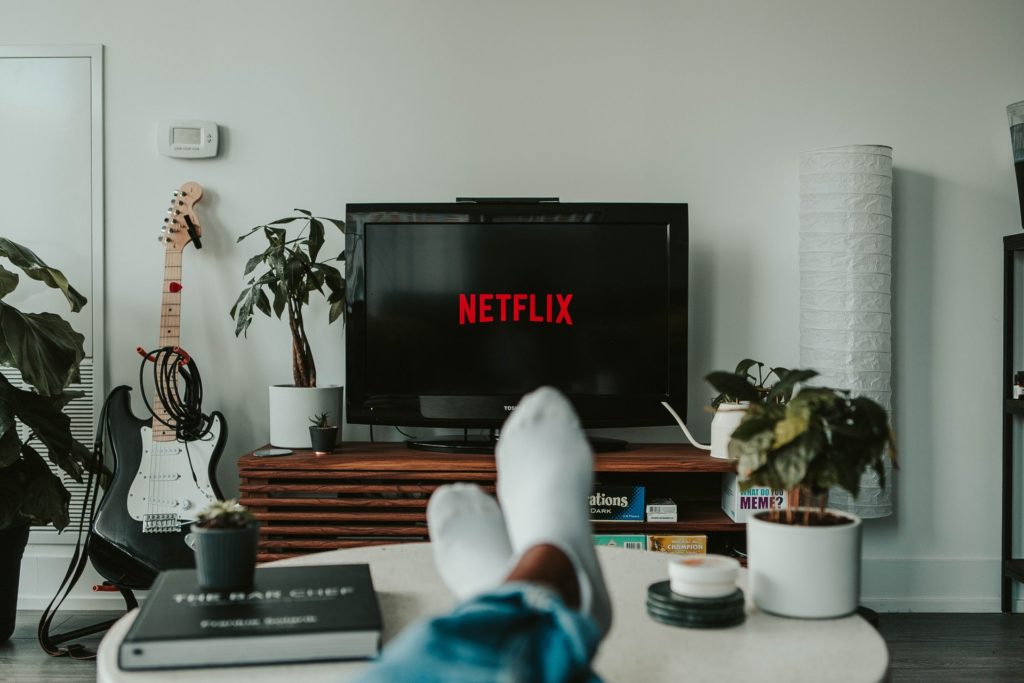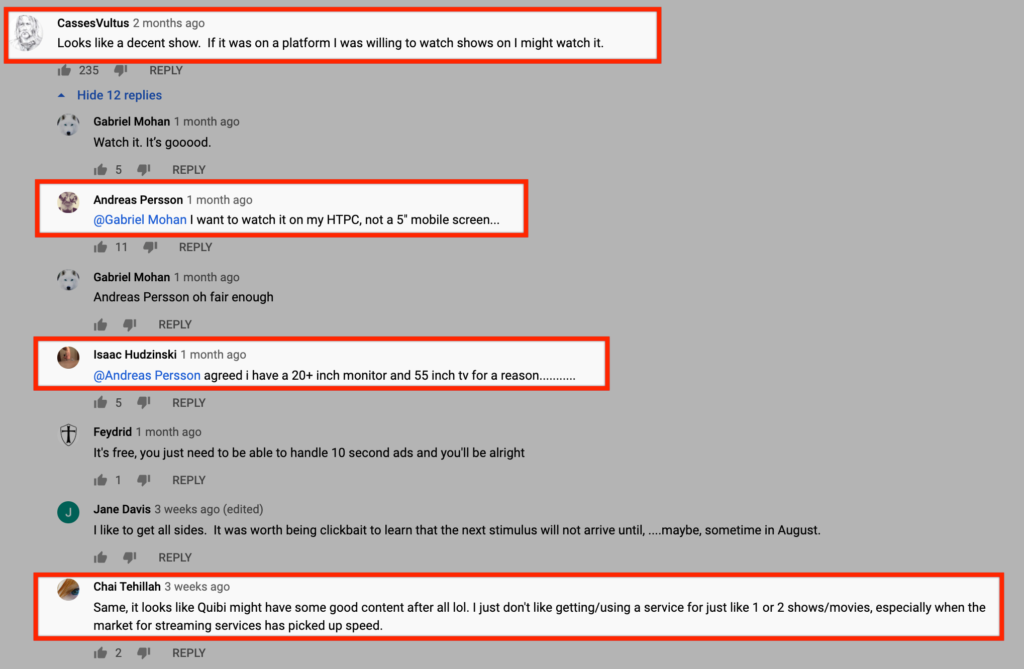In April of this year, Hollywood veteran Jeffrey Katzenberg and tech veteran Meg Whitman launched the long-awaited streaming platform Quibi. The promise? To provide entertainment and news to busy people on the go. These would be short, 7- to 10-minute shows (i.e. “quick bites”) that would be consumed during all those “in between” moments when you’re out about and about (e.g. waiting in lines, watching the kids at the park, sitting in stop and go traffic, etc.) The catch? It would only be available, wait for it, on your phone.
Prior to launch, there was a lot of head-scratching by tech and industry professionals as to why anyone would start yet another streaming service in an already over crowded market. But with Katzenberg’s stellar record and connections in Hollywood, combined with Whitman’s tech experience (she was CEO of both eBay and Hewlett Packard, and serves on the board of Dropbox), investors were willing to take that $1.8 BILLION gamble.
So with names like Spielberg, Idris Elba, Guillermo del Toro, Chrissy Tiegan, and a slew of other big names, Quibi set out to create a string of new content at the highest possible level.
Unfortunately, by all accounts, the launch has been deemed a colossal failure. Subscriptions have been anemic, and many people are still in the dark as to what Quibi even is (this was confirmed by a recent post I made on the Blue Collar Post Collective Facebook group where a number of professionals still hadn’t even heard about it)
I want to look at some of the reasons Quibi failed and what lessons filmmakers and content creators can learn from that failure.
But first…
A quick bite of history
Once upon a time, in a land not too far away, was a world where the televisions of America had only three major networks, about two dozen channels, and at about 2 am in the morning, all broadcasting ceased. You heard me. It just stopped. In place of your regular scheduled programming, was a montage of American flags and soldiers with various patriotic songs. Then…bars and tone.
In this not too distant past, “television” and “movies” were distinctly different. The former was more square(ish) and the visual quality left something to be desired.

The latter was wide and grand and burst with colors and sounds that would take you to other worlds. The stories were more engaging and the characters more interesting.
Oh how times have changed…
“What streams may come…”
Today’s landscape of on-screen entertainment has evolved leaps and bounds in just two generations. “Television” once referred to the format and device on which you watched programming, as well as the quality of the programming itself. Today, TV is not dependent on a specific device, and some of the most engaging, interesting, and entertaining content online or over the “airwaves” falls under the category of “Television.” Television programming is available 24/7 and it is not uncommon for a major metropolitan area to have close to 1,000 channels!

In a post-cable world where where so many individuals are cutting the proverbial cords in favor of a la carte streaming services like Netflix, Hulu, Amazon, Apple TV+, Disney+, CBS All-Access, HBO Max, and now Peacock, along comes Quibi . I already have a hard enough time deciding which services to pay for among the ever-growing landscape. Now I’m being asked to consider yet another. But I can only watch it on my iPhone?
Marshall McLuhan strikes again
Famed Canadian philosopher, professor, and communication theorist Marshall McLuhan coined the phrase, “the medium is the message” back in the late 60s. In short, the meaning is that the medium on which a message (i.e. “content”) is transmitted is more important than the message itself.
I used to have trouble understanding how this could be the case. Isn’t the content the most important thing? How could it not be? That is until Quibi came along. There is perhaps no better example of McLuhan’s prescience than the failing streaming service.
Here you have some of the most amazing, engaging, and creative content created by some of the world’s greatest cinematic artists and storytellers. You would think that content this engrossing would be consumed whenever and however it can. If you’re forced to watch it on a 7” iPhone, so be it. The message seems to be more important than the medium.
But that would be a highly reductive understanding of McLuhan’s message. The core of McLuhan’s message is that the medium transforms our vary culture, even our brain patterns. Going from print to radio to television to computer internet content, all have created transcendental shifts in communication and creation.
Quibi’s failure actually exemplifies McLuhan’s statement. For example: I saw the first episode of Quibi’s show, “Most Dangerous Game,” starring Christoph Waltz and Liam Hemsworth (Quibi posted the first episode online in hopes of generating new subscribers). The whole time watching it, I was thinking, “Why are they forcing people to watch this engaging and intense action flick on my iPhone?” As I watched episode 1 on my laptop I was jonesing to get into a theater and watch this baby on a full screen. Hell, even a large HD TV would be awesome. (Yes, I know you can air stream it, but sometimes there are latency issues).
Admittedly, the inability to watch Quibi’s content on large screens doesn’t necessarily track back precisely to the transformation of how we consume content—but it does exemplify how the way we consume content affects our relation to that content. I hazard to guess that if the first time you saw Star Wars: Episode IV was on a television, or, heaven forbid, a 7” iPhone, seeing that imperial cruiser take “forever” to fly through the screen “above” would have had little to NO effect on you. Compare that to when I first saw it sitting in a movie theater and my jaw nearly dropped as I sat there in awe. I’ve interviewed so many filmmakers over the years who have pointed out that scene as being a transformative experience.
Quibi is not creating transformative experiences, despite the fact it has content that has the ability to do just that. The medium is the message—and the “message” Quibi has communicated is missing the mark.

Isn’t it ironic?
It’s no coincidence that the title of this section references another well-known Canadian, Alanis Morrissette. Her 90s hit “Isn’t it Ironic” is a musical collage of ironic situations—like meeting the man of your dreams a split second before meeting his gorgeous wife; or being afraid to fly your whole life, then having the plane of your first flight come crashing down.
If Alanis were to write a line in her song about Quibi, it would be something like,
“They spent their whole career, whining about how digital would make cinema fall,
right before making a film that was 100 sizes too small.
Isn’t ironic?”
Okay, so maybe lyrical composition is not exactly my strong suit. But hopefully you get my point. I find it ironic that they got some of the most die-hard, puritanical cinephile filmmakers—the kind who might call Marvel movies “amusement park rides” and “not real cinema”—to make content for them, is a testament to Katzenberg’s charm and pull in the industry. But how many times have you gone to a movie theater and seen those PSAs exhorting you not to watch movies on your telephone. Or clips from filmmakers like David Lynch saying things like this:
“Now, if you’re playing your movie on a telephone, you will never in a trillion years, experience the film… It’s such a sadness that you think you’ve seen a film on your FUCKING telephone!”
There is one reason I can see why these cinema purists would take this deal: they get to retain the copyrights. Per this NY Times article:
Mr. Katzenberg and Ms. Whitman had an easy time making deals partly because of the terms they offer: The company pays for production costs and licensing rights, allowing the creators of Quibi programs to retain copyright, meaning they can sell their work to another platform or network after a set number of years.
There’s no doubt some blame can be placed on the stay-at-home orders that swept across the world in the wake of the coronavirus global pandemic. But one cannot ignore the fact that this service was forcing people into a medium that many do not want for the kind of content they were creating. Nor can you ignore some other seeming missteps by the streamer.
Head-scratching decisions
In another example illuminating McLuhan’s message, Quibi turned off the ability to take screenshots. That means one of the most effective way for any piece of content to spread (word of mouth via social media) was significantly handicapped. The medium of social media plays a huge role in any campaign. For instance: the Egyptian revolution of 2011 was largely successful partly due to the extensive use of Facebook and other social media by activists who organized and publicized demonstrations and acts of nonviolent civil disobedience. The 2016 presidential election was largely affected when Russia interfered largely social media platforms like Twitter and Facebook. It baffling that they would prevent users from using such a powerful medium. (Apparently, as of this writing, Quibi has plans to make it possible to share shows via social media).
Another head-scratcher: refusing to hire and work with content creators who had already proven themselves on this format (small, bite-sized content on small screens). There are dozens, if not hundreds of TikTok, Instagram, and even YouTubers who have garnered hundreds of thousands and even millions of followers with their short content. Yet, none were recruited or given Quibi deals. Quibi’s management seem to be profoundly detached from what is happening in the current millennial zeitgeist. Instead of recruiting these artists who are already killing it, they’re using superstar filmmakers and actors to reboot old stuff like The Fugitive and Punk’d (in all fairness. I found their Princess Bride Covid Quarantine Collaboration delightfully entertaining. But at 50+ years old, am I really the target demographic?)
Questionable creations
Last and certainly not least in the review of Quibi missteps, it appears as if Quibi might have plagiarized at least one show. One of its premier releases was “Memory Hole,” a show that looks at pop culture throwbacks and trends. It’s look and title is conspicuously similar to that of YouTube show “Everything is Terrible” and their follow up “Memory Hole” (yes, they used the same title).
Shout! Factory, makers of Quibi’s “Memory Hole” wrote responded in a tweet:
“Memory Hole” is an original show. The name of the show was inspired by George Orwell’s “1984,” and the graphics are based on generic retro ’80s arcade games. Anything that suggests otherwise is not true. We stand by our work.”
The overwhelming response to this situation and tweet was negative (for Quibi). Anyone who creates a new show knows that it’s imperative to do some basic due diligence to make sure no other show already exists that is too similar. I work as a Story Producer for Wistia’s podcast team, and we spent weeks Googling terms of potential podcast names for a show we’re creating. So, no, this absolutely does not fly that “Memory Hole’s” creators had no idea another show with the same name by a YouTube channel that had used very similar artwork, didn’t already exist. And as one person in the above tweet stream mentioned, Quibi could have capitalized on an existing and vast fan base, but instead pissed them off and alienated them.
The lessons we can learn from Quibi
So what can we learn from the various missteps Quibi has taken.
First, if you’re going to enter an already crowded market, offer something that truly is unique. Quibi is yet another streaming service in a sea of streaming services. Instead of offering truly fresh perspectives, they were rebooting old shows and treading on old territory. The one unique aspect of Quibi’s content, the ability to view the shows vertically or horizontally, is hardly a selling point to pay another five or more dollars a month. All their competitors offer great content that can be seen on ANY device (and in some cases, even the movie theater). Which leads to lesson #2.
The medium is the message. The way we watch and consume content has changed the very way we relate to it. Don’t ignore that. If you’re going to make your content medium-dependent, you’re making a bet that McLuhan got it wrong and that the content can transcend the medium. While it may be true that “content is king,” the medium is the “country,” and without inhabitants, there is no one to be “king” of.
Third, if you’re going to spend an ungodly amount of money to start a new media company, invest a good chunk of that in artists who have already succeeded in the frontier you’re attempting to conquer. Quibi did the opposite and invested in artists who had succeeded in the “frontier” they were expressly forbidding you from using.
And last but certainly not least, if you’re going to spend more money than the Gross National Product of a small country, invest another good chunk in marketing. And for goodness sake, don’t prevent people from using natural viral marketing means to spread the word.
Recommendation for Quibi
According to this NY Times interview with Katzenberg, as of May 2020 (a month into its launch) there were only 2.9 to 3.5 million downloads of the app (depending on whom you believe). Either way you look at it, those are disappointing numbers, and Katzenberg blames all of Quibi’s woes on the pandemic. But given all that I covered here, I agree with progressive news YouTuber Cody Johnston when he says that its failure probably has more to do with with all the missteps and head-scratchers you just read about.
Quibi can’t change the fact they spent nearly $2 billion to make this platform. But they can pivot, and focus on the fact they have unique content from the likes of Spielberg, Guillermo Del Toro, Jason Blum House, Tom Cruise, etc. That is essentially what ALL the streaming services are doing—creating unique content that you can only watch on their platforms. That is what’s going to get people to watch and subscribe. Not that you now give them something to watch when they’re standing in line at the grocery store (which may or may not take the 7 minutes and 45 seconds to watch an episode).
Meg and Jeff, if I were you, I’d dump this whole mobile-only thing, and make this content available like everything else I watch (assuming your license agreements even allow that). Or don’t. What do I know?
How about you? What do you think? If you’re a Quibi subscriber, are there any shows on it you like? Do you like them enough to keep subscribing? What do you think Katz and Whit should do?
+++
You might like this other article about Quibi.

Filmtools
Filmmakers go-to destination for pre-production, production & post production equipment!
Shop Now













